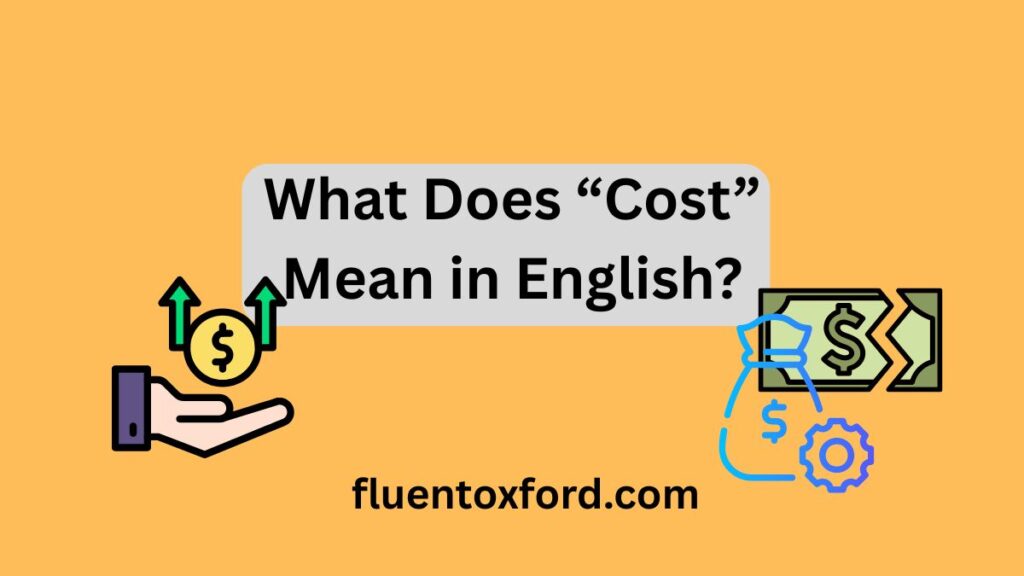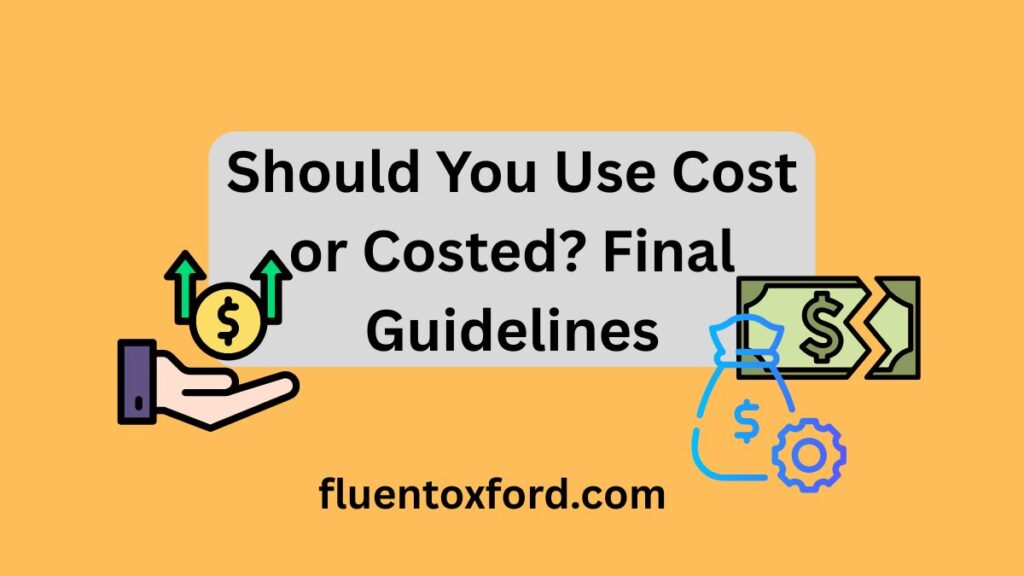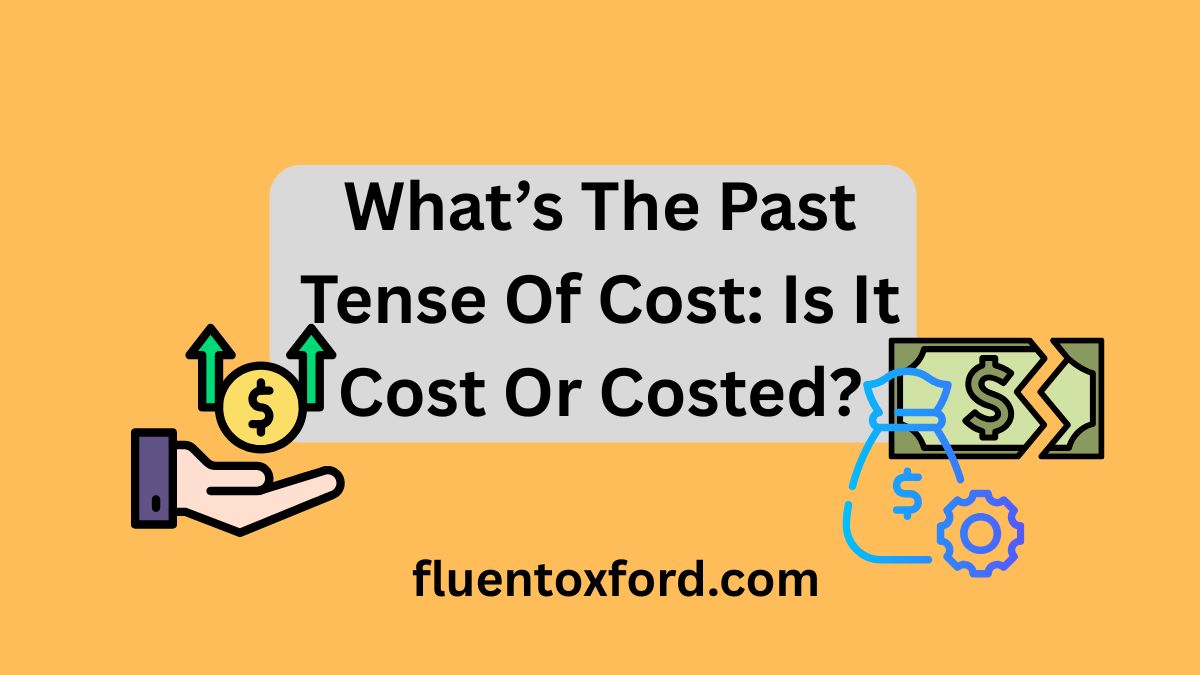The phrase “Past Tense of Cost: Is It Cost or Costed?” refers to the grammatical confusion surrounding the correct past tense of the verb “cost.” In English, irregular verbs like “cost” often maintain the same form in present, past, and past participle tenses, unlike regular verbs that typically add “-ed.” This discrepancy creates uncertainty among writers and speakers, especially when determining whether to use “cost” or “costed” in different contexts. Understanding how this verb behaves can significantly improve grammar precision and communication clarity.
\Imagine presenting a polished business report or writing a compelling article only to stumble over a simple verb like “cost.” It’s a small detail, but it carries weight. Misusing verb tenses can subtly undermine your credibility. Grasping the correct form of the Past Tense of Cost: Is It Cost or Costed? is not just a grammar fix—it’s a confidence boost for professionals, students, and writers who want their language to reflect accuracy and fluency.
The answer isn’t always straightforward. While “cost” is traditionally used in most past tense situations, “costed” has a place in specific contexts, especially in technical or financial language. This subtle distinction makes the Past Tense of Cost: Is It Cost or Costed? an essential topic for anyone striving for grammatical excellence. Whether you’re writing everyday emails or academic papers, mastering the Past Tense of Cost: Is It Cost or Costed? can sharpen your linguistic edge and elevate your writing.
Why the Confusion Around Cost vs Costed?
Many learners—and even native speakers—find themselves scratching their heads over this one. Here’s why:
- “Cost” is an irregular verb, meaning its past tense form doesn’t follow the usual -ed pattern.
- However, in certain technical or financial contexts, you’ll see “costed” used.
- Some think “costed” is simply wrong. Others defend it based on usage in professional jargon.
So what’s going on? The answer lies in understanding context, verb forms, and meaning.
What Does “Cost” Mean in English?

“Cost” is a verb and a noun, and its meaning depends on how it’s used.
As a Verb:
- It means to require payment or to have a price.
- “This laptop cost me $1,200.”
- It can also mean to cause loss or sacrifice.
- “His mistake cost him the promotion.”
As a Noun:
- It refers to the amount of money required to buy or do something.
- “The total cost of repairs was $500.”
Variations Across Regions:
- Both American and British English primarily use “cost” in the past tense.
- “Costed” appears more frequently in UK-based business English, especially in accounting and cost analysis contexts.
The Correct Past Tense of “Cost” (According to Grammar Rules)
Let’s get straight to it:
In general usage, the past tense of “cost” is “cost.”
It’s an irregular verb, just like “cut,” “put,” or “hit”—the form stays the same in both present and past tense.
Examples:
- Present: “These jeans cost $80.”
- Past: “Yesterday, these jeans cost $80.”
- Future: “They will cost more next month.”
Fun Fact:
The past participle of “cost” is also cost. So you’d say:
- “It has cost us a lot of time.”
This rule applies to 99% of casual and formal situations.
When Costed Is Also Grammatically Correct
Here’s where it gets interesting. “Costed” isn’t wrong—but it’s only right in specific scenarios.
When “Costed” Makes Sense:
- When referring to a deliberate action of calculating or estimating costs.
- Common in business, project estimation, accounting, and financial contexts.
- It refers to the process of evaluating cost, not just the amount.
Cost vs Costed — A Quick Comparison Table
| Scenario | Correct Form | Example |
| General past reference | Cost | “The meal cost $40.” |
| Financial analysis context | Costed | “They costed the product development at $2M.” |
| Personal purchase history | Cost | “It cost me a fortune.” |
| Project estimation (technical) | Costed | “We costed the entire campaign before launch.” |
| Emotional consequence | Cost | “That argument cost him a friendship.” |
Real-World Examples in Sentences

Let’s see how both forms work in real sentence structure.
Using “Cost” in Context
These are typical, everyday uses:
- “That jacket cost more than I expected.”
- “Her decision cost the company a valuable client.”
- “It cost me three hours to fix that error.”
- The new iPhone may be impressive, but its high cost is making many people think twice before upgrading.
- Repairing the old car ended up costing more than buying a newer used one.
- The environmental cost of fast fashion is becoming a growing concern worldwide.
- She weighed the cost of quitting her job against the freedom of starting her own business.
- Due to inflation, the cost of groceries has increased significantly over the past year.
Using “Costed” in Context
Now let’s look at examples in technical contexts:
- “The engineers costed the building materials for the blueprint.”
- “We costed the entire migration project in Q3.”
- “She costed several versions of the marketing plan.”
- The construction project was carefully costed before any work began.
- The event planner costed out every detail to stay within the client’s budget.
- They costed the new product line to determine if it would be profitable.
- The marketing campaign was poorly costed, leading to unexpected expenses.
- We costed several travel options before booking the cheapest flight and hotel package.
Notice the nuance: “Costed” means a deliberate estimation or financial analysis.
Synonyms for “Cost” and “Costed”
Sometimes the easiest way to tell what you mean is to use an alternative word.
Alternatives to “Cost” (General Use):
Sure! Here are 8 synonyms for “cost” with brief explanations of 6–7 words each:
- Price – The amount paid to buy something.
- Expense – Money spent on a specific need.
- Charge – A fee demanded for a service.
- Fee – Payment for professional or official services.
- Rate – A set amount for specific service.
- Toll – A charge for using infrastructure or service.
- Outlay – A large or planned financial expenditure.
- Value – Worth of something in monetary terms.
Alternatives to “Costed” (Technical Use):
- Priced – Assigned a monetary value to something.
- Estimated – Gave an approximate calculation of value.
- Calculated – Worked out total amount or value.
- Evaluated – Assessed worth or financial impact carefully.
- Budgeted – Planned and allocated expected financial resources.
- Assessed – Judged the cost based on analysis.
- Appraised – Determined value, often professionally reviewed.
- Quoted – Provided a specific price or estimate.
The Etymology of “Cost”
Understanding where a word comes from can help explain its quirks.
- Origin: From Latin constare, meaning “to stand firm” or “to be fixed.”
- Through Old French coste, then into Middle English as costen.
- Over time, “cost” evolved into both a fixed amount (noun) and an action of paying or losing something (verb).
The irregular form stuck—because English, like cost, can be unpredictable.
Verb Conjugation of “Cost”
Let’s take a closer look at its conjugation.
| Tense | Verb Form |
| Base Form | cost |
| Simple Present | cost/costs |
| Simple Past | cost |
| Past Participle | cost |
| Present Participle | costing |
For “costed,” the conjugation pattern follows regular verbs:
| Tense | Verb Form |
| Base Form | cost |
| Simple Present | cost/costs |
| Simple Past | costed |
| Past Participle | costed |
| Present Participle | costing |
But remember: “Costed” is only used when referring to calculated pricing or financial planning.
Should You Use Cost or Costed? Final Guidelines

Here’s a quick breakdown to help you decide which form to use.
Use “Cost” when:
- You’re talking about how much something was priced at in the past.
- You’re referring to an outcome or result, like a loss or sacrifice.
- You’re describing an unintentional action.
Use “Costed” when:
- You mean someone intentionally estimated a price or calculated cost.
- You’re writing in a technical, financial, or business context.
- You want to emphasize planning or analysis.
📌 Key Takeaways
- “Cost” is the irregular past tense for general usage.
- “Costed” is the regular past tense used in calculated or analytical contexts.
- Use sentence context and intent to decide which form to use.
- English grammar allows both—when used correctly.
Conclusion
In conclusion, understanding the Past Tense of Cost: Is It Cost or Costed? is important for using correct English. The word “cost” usually stays the same in the past tense. For example, we say, “The shoes cost $50 yesterday.” This is the correct and most common use, especially when talking about prices or money.
However, “costed” can be used in special cases. It is often used in business or planning when someone calculates prices. For example, “The project was costed by the manager.” So, when asking Past Tense of Cost: Is It Cost or Costed?, remember: use “cost” for most situations and “costed” only when talking about the act of calculating a cost. This small difference can help you speak and write more clearly.
FAQs
Q1: Is “costed” grammatically correct?
Yes, “costed” is correct when referring to calculated or estimated costs, especially in finance, accounting, or project planning.
Q2: Should I say “It costed $50” or “It cost $50”?
The correct form is “It cost $50”. Use “costed” only when discussing estimations, not actual prices.
Q3: Do native English speakers use “costed”?
Rarely in everyday conversation, but frequently in business and technical contexts, such as “The project was costed at $2 million.”
Q4: Is “cost” an irregular verb?
Yes. “Cost” is an irregular verb, meaning its past tense and past participle remain the same: cost.
Q5: What’s the difference between “priced” and “costed”?
“Priced” focuses on the value set for sale, while “costed” involves calculating internal or projected expenses, often in budgets or planning.

As an admin at Fluent Oxford, Maida Queen is the driving force behind our vibrant learning community. With a deep passion for English language education, she ensures that our platform remains a dynamic, engaging, and supportive space for learners worldwide.
Maida expertly manages content, assists users with their grammar and fluency queries, and fosters an interactive environment where learning feels effortless and enjoyable. Whether you need guidance, motivation, or just a friendly face in the Fluent Oxford community, Maida is always there to help you reach your English language goals.








